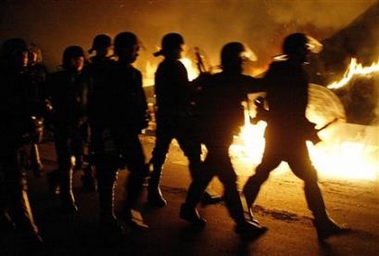|
Paris gripped by new riots despite government resolve
(AFP)
Updated: 2005-11-04 09:46
Fresh rioting broke out on the outskirts of Paris overnight as gangs of
youths challenged authorities' vows to crack down on urban violence that has
plagued the French capital for over a week.

Riot police advance
during clashes with French youths in Paris suburb of Aulnay sur Bois,
early November 3, 2005, in a seventh night of rioting. Street fighting,
sparked by the deaths of two teenagers electrocuted while apparently
fleeing police during a local disturbance, spread to other parts of the
poor suburbs ringing the capital to the north and the east.
[Reuters] |
| Police
said more than 40 vehicles were torched in the worst-hit northeastern region of
Seine-Saint-Denis, where 1,300 officers were deployed, and more than 30 people
were arrested there and elsewhere.
Shots were also fired at riot police vans without causing injury.
A top government official for the region, Jean-Francois Cordet, said the
violence was "spreading to the east and north" of Seine-Saint-Denis with only a
few areas with a heavy police presence remaining "relatively calm."
Five officers were hurt by projectiles thrown by youths in the western suburb
of Mantes-La-Jolie.
And for the first time since the troubles first erupted on Thursday of last
week, there were sporadic signs of copycat rampages elsewhere in France. Police
said several cars in the eastern city of Dijon were set alight.
The rioting was a direct challenge to the authority of the French government
and to Prime Minister Dominique de Villepin in particular.
Villepin on Thursday vowed before parliament that authorities "will not give
in" to the violence and would make restoring order their "absolute top
priority".
"I will not allow organised gangs to make the law in the suburbs," he
declared.
The clashes have gained territory virtually every night since they began,
exposing what sociologists and commentators said was a blatant failure of
successive governments to address the problems of low-income, high-immigration
suburbs dominated by grim public housing estates, some of them little more than
ghettos where crime and gangs run rampant.
The riots were sparked last week by the accidental electrocution of two
teenagers who had hidden in an electrical sub-station to escape a police
identity check in the suburb at the epicentre of the troubles, Clichy-sous-Bois.
The opposition Socialist Party and many in the suburbs themselves blamed
hardline policies by Interior Minister Nicolas Sarkozy for fanning the violence.
Sarkozy, who Thursday said the total number of people arrested was over 140,
vowed a "war without mercy" on crime and rebellious youths in the suburbs just
before the rampages erupted.
The minister, also leader of the conservative UMP ruling party with ambitions
of running for president in two years' time, has drawn criticism for his tough
rhetoric, especially for referring to delinquents as "rabble".
On Thursday, he claimed that recent rioting "was not spontaneous, it was
perfectly organized -- we are looking into by whom and how."
Villepin -- who cancelled a trip to Canada to tackle the crisis -- said the
violence was "unacceptable". President Jacques Chirac on Wednesday called for
calm, warning that an escalation would be "dangerous".
The country has 751 neighbourhoods officially classed as severely
disadvantaged, housing a total of five million people, around eight percent of
the population.
Conditions are often dire with high-rise housing, unemployment at twice the
national rate of 10 percent and per capita incomes 40 percent below the national
average.
Many of France's estimated five million Muslims live in those suburbs.
Thursday night was the end of the Islamic holy month of Ramadan, a night
traditionally marked by feasts and family get-togethers.
|